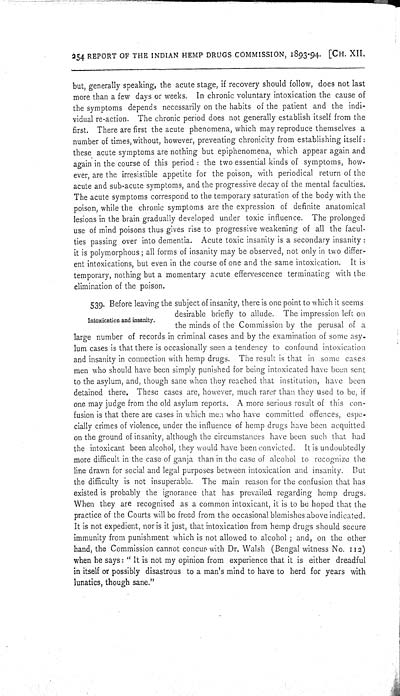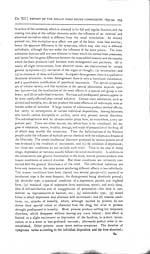Medicine - Drugs > Report of the Indian Hemp Drugs Commission, 1894-1895 > Volume I
(287) Page 254
Download files
Individual page:
Thumbnail gallery: Grid view | List view

254 REPORT OF THE INDIAN HEMP DRUGS COMMISSION, 1893-94. [CH. XII.
but, generally speaking,
the acute stage, if recovery should follow, does not last
more than a few days or weeks. In chronic voluntary intoxication
the cause of
the symptoms depends necessarily on the habits of the patient and
the indi-
vidual re-action. The chronic period does not generally establish
itself from the
first. There are first the acute phenomena, which may reproduce
themselves a
number of times, without, however, preventing chronicity from
establishing itself:
these acute symptoms are nothing but epiphenomena, which appear
again and
again in the course of this period: the two essential kinds of
symptoms, how-
ever, are the irresistible appetite for the poison, with periodical
return of the
acute and sub-acute symptoms, and the progressive decay of the
mental faculties.
The acute symptoms correspond to the temporary saturation of the
body with the
poison, while the chronic symptoms are the expression of definite
anatomical
lesions in the brain gradually developed under toxic influence. The
prolonged
use of mind poisons thus gives rise to progressive weakening of all
the facul-
ties passing over into dementia. Acute toxic insanity is a
secondary insanity:
it is polymorphous; all forms of insanity may be observed, not only
in two differ-
ent intoxications, but even in the course of one and the same
intoxication. It is
temporary, nothing but a momentary acute effervescence terminating
with the
elimination of the poison.
Intoxication and insanity.
539. Before leaving the
subject of insanity, there is one point to which it
seems
desirable briefly to allude.
The impression left on
the minds of the Commission by the perusal of a
large number of records in criminal cases and by the examination of
some asy-
lum cases is that there is occasionally seen a tendency to confound
intoxication
and insanity in connection with hemp drugs. The result is that in
some cases
men who should have been simply punished for being intoxicated have
been sent
to the asylum, and, though sane when they reached that institution,
have been
detained there. These cases are, however, much rarer than they used
to be, if
one may judge from the old asylum reports. A more serious result of
this con-
fusion is that there are cases in which men who have committed
offences, espe-
cially crimes of violence, under the influence of hemp drugs have
been acquitted
on the ground of insanity, although the circumstances have been
such that had
the intoxicant been alcohol, they would have been convicted. It is
undoubtedly
more difficult in the case of ganja than in the case of alcohol to
recognize the
line drawn for social and legal purposes between intoxication and
insanity. But
the difficulty is not insuperable. The main reason for the
confusion that has
existed is probably the ignorance that has prevailed regarding hemp
drugs.
When they are recognised as a common intoxicant, it is to be hoped
that the
practice of the Courts will be freed from the occasional blemishes
above indicated.
It is not expedient, nor is it just, that intoxication from hemp
drugs should secure
immunity from punishment which is not allowed to alcohol; and, on
the other
hand, the Commission cannot concur with Dr. Walsh (Bengal witness
No. 112)
when he says: "It is not my opinion from experience that it is
either dreadful
in itself or possibly disastrous to a man's mind to have to herd
for years with
lunatics, though sane."
Set display mode to: Large image | Zoom image | Transcription
Images and transcriptions on this page, including medium image downloads, may be used under the Creative Commons Attribution 4.0 International Licence unless otherwise stated. ![]()
| India Papers > Medicine - Drugs > Report of the Indian Hemp Drugs Commission, 1894-1895 > Volume I > (287) Page 254 |
|---|
| Permanent URL | https://digital.nls.uk/74574640 |
|---|---|
| Description | Chapter XII, cont. |
| Description | [Volume 1]: Report. |
|---|---|
| Attribution and copyright: |
|




![Page [255]](https://deriv.nls.uk/dcn4/7443/74435001.4.jpg)